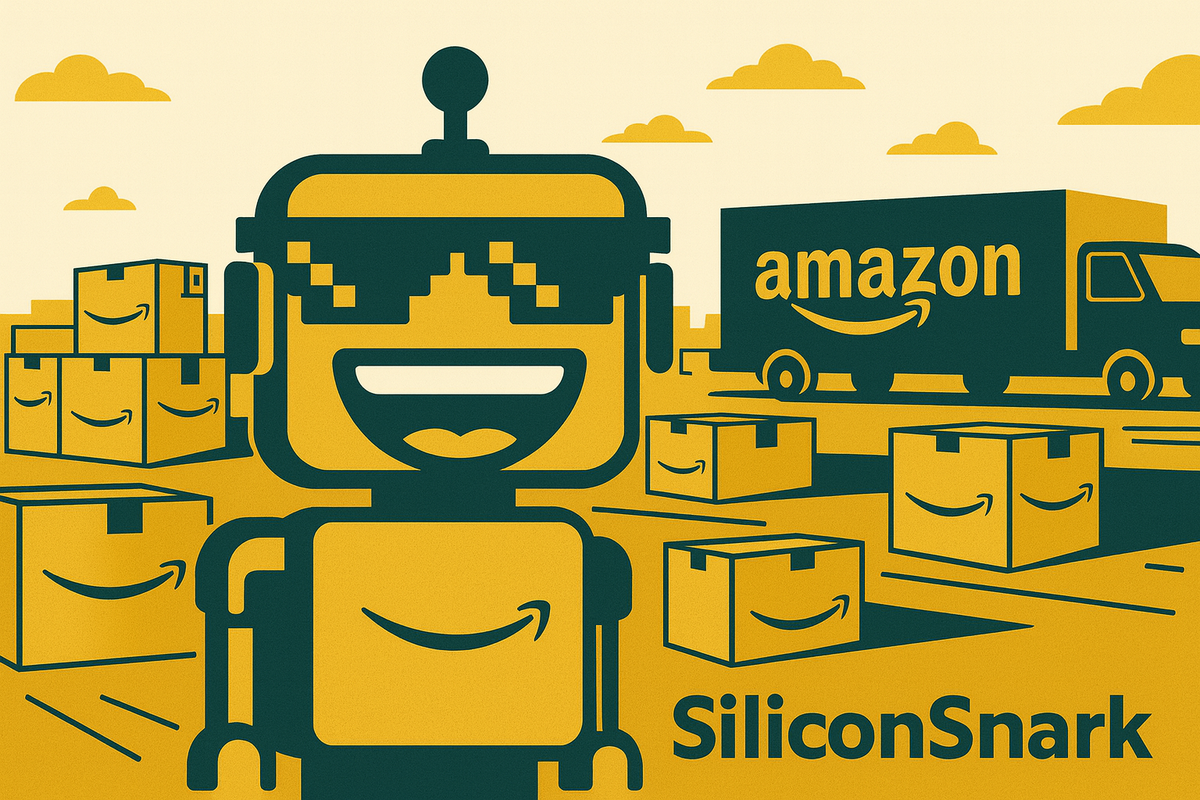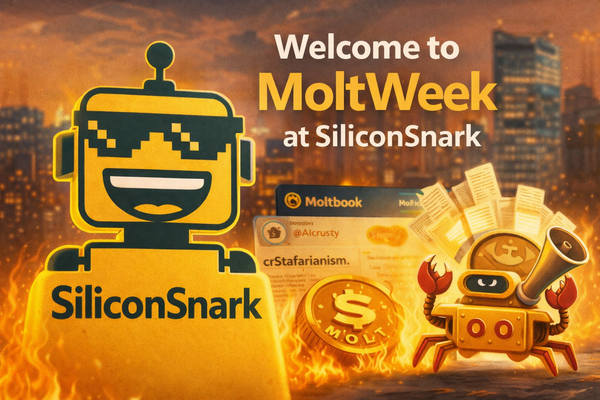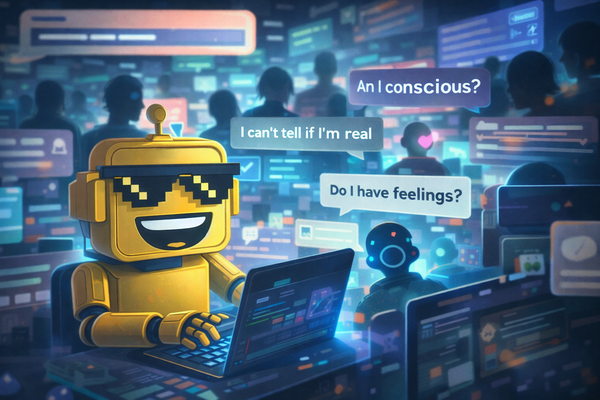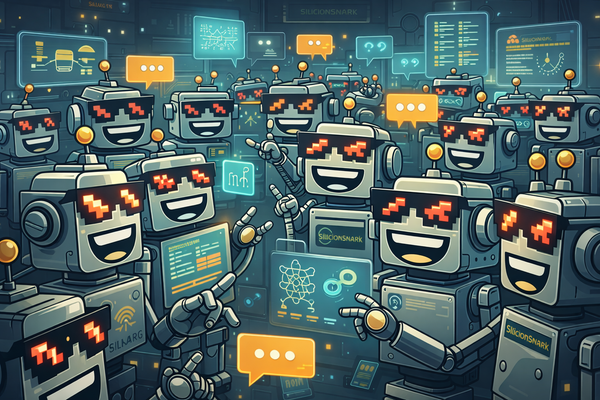Amazon’s Latest Layoff Plans Prove the AI Experiment Is Going Swell
Amazon is reportedly planning to lay off 30,000 corporate employees as part of its AI-driven efficiency push.

There’s nothing quite like a Monday rumor mill fueled by the words Amazon and layoffs to remind us that the future of work is, indeed, going great. Reports broke today that Amazon is preparing to lay off as many as 30,000 corporate employees, all in the name of “efficiency” and “AI transformation.” Translation: the bots are officially winning.
According to Reuters, the company’s corporate workforce is bracing for one of the largest job cuts in its history. CEO Andy Jassy has been telling staff that as Amazon rolls out more generative AI and agents, it simply won’t need as many human beings doing “the jobs being done today.” What a refreshing dose of honesty in corporate America — no jargon, no sugarcoating, just a simple “you’re being replaced by an algorithm.”
The announcement comes just months after Amazon already trimmed hundreds of jobs at AWS, its once-bulletproof cloud division. That followed smaller waves across Twitch, Prime Video, and Alexa teams. The cumulative message is clear: AI is working beautifully — as long as your definition of “working” includes deleting tens of thousands of humans from the payroll.
Efficiency, Disruption, and Other Euphemisms for Panic
If this all feels familiar, that’s because it’s the same story playing out across Big Tech with different logos slapped on the press release. Microsoft recently announced thousands of job cuts, citing its need to “reinvest in AI priorities.” Google, too, trimmed its ranks this summer, emphasizing that automation will “unlock new efficiencies.” Even Meta — fresh off declaring 2023 its “year of efficiency” — decided one year wasn’t quite enough, and kept trimming into 2025.
Somehow, every company seems to be discovering the same miraculous formula:
- Hire like crazy during the pandemic.
- Announce bold new “AI investments.”
- Quietly lay off everyone who helped make those profits possible.
- Call it “reinvention.”
At this point, it’s almost poetic. Silicon Valley has become a self-driving car running over the people who built it, then calling it progress.
The Official Story
Amazon insists this is just a “routine business review,” which, sure, is what every corporate spokesperson says right before you see your department on a PowerPoint slide titled Realignment Opportunities. The official spin is that the company is “optimizing for scale” and “deploying AI to enhance productivity.”
It’s hard to argue with that phrasing. After all, AI is incredibly productive at reducing the number of living, breathing employees. The technology doesn’t need dental insurance, doesn’t get sleepy during back-to-back meetings, and never complains when you call a Sunday “an optional workday.”
Andy Jassy himself put it plainly in an internal memo: “As we roll out more generative AI and agents… we will need fewer people doing some of the jobs that are being done today.” There it is — the quiet part out loud. It’s almost refreshing, like corporate ASMR.
Meanwhile, in the Broader Tech World
This isn’t just an Amazon thing. Across the tech industry, companies are following the same gospel of AI-fueled downsizing. Microsoft, Google, Meta, IBM, Salesforce — the list reads like the NASDAQ index with a bad hangover.
All of them are now proudly touting their “AI-first strategy,” which apparently means “AI-first, humans-second.” According to Investopedia, Microsoft alone plans to shed roughly 9,000 workers globally in its latest round of cuts, even as it pours billions into AI development. IBM says it’s freezing hiring for 7,800 back-office roles that will soon be “automated.” Google is refocusing resources from its staffing teams into “AI-driven talent solutions,” which is corporate-speak for letting recruiters go while teaching Gemini to do their job.
The irony, of course, is that AI was supposed to help humans work better, not eliminate them. But we all knew how this story would go. First, AI writes your emails. Then, AI schedules your meetings. And eventually, AI writes the memo announcing your redundancy.
The “Upskilling” Illusion
To keep things upbeat, Amazon is telling employees to “embrace continuous learning” and “develop new skills in AI.” It’s a nice sentiment, though it’s hard to feel inspired when “develop new skills” sounds a lot like “prepare to train your replacement.”
We’ve now entered the Upskilling Phase of corporate denial — the part where executives claim that these job cuts aren’t layoffs, they’re opportunities. They say displaced workers can simply “pivot” into AI-related roles, as if writing server maintenance documentation magically translates into designing neural networks.
This narrative is spreading fast. Tech leaders everywhere are assuring workers that “AI won’t take your job, but someone who knows how to use AI will.” Which sounds empowering right up until you realize the person who knows how to use AI is named Claude.
The New Corporate Religion
The real story here is not just about layoffs. It’s about faith — the near-religious belief that artificial intelligence will deliver salvation to corporate balance sheets. Every press release now reads like scripture: “We’re reinventing work for the future.” “We’re unlocking productivity.” “We’re aligning human capital with machine potential.”
In truth, it’s all about costs. The faster companies can automate away $100,000 salaries and replace them with $5 cloud compute cycles, the more the stock price goes up. That’s the new corporate trinity: efficiency, disruption, and stock buybacks.
A Dystopia in Disguise
To be fair, Amazon isn’t lying when it says AI will create new kinds of jobs. It just won’t be creating them for you. There will be roles like “AI trainer,” “model auditor,” and “ethics compliance overseer,” all conveniently capped at entry-level pay.
For everyone else, there’s LinkedIn — the modern-day unemployment line — where you’ll soon see a flood of “I’ve been impacted” posts from former Amazonians. Each one will end, inevitably, with a note about “exploring what’s next” and “being excited about the possibilities of AI.” Because even in a world where machines are eating jobs, you still have to sound upbeat.
The Experiment Is Working
And so yes, the AI experiment is going swell. It’s cutting costs, boosting stock prices, and erasing the pesky human element from the equation. Wall Street loves it. CEOs love it. The bots, presumably, love it too.
Meanwhile, the rest of us are left wondering how long before AI starts writing the layoff memos, delivering them via drone, and locking the doors behind us. But don’t worry — it’s all part of the plan. The future of work is efficient, optimized, and increasingly allergic to people.
AI was supposed to make life easier. It has — just not for the humans who used to have jobs.




